- Home
- Judith McNaught
Whitney, My Love
Whitney, My Love Read online
Dear Reader,
As I write this letter to you, all my past books are being readied for release in digital format. Naturally, I’m delighted, but in the case of Whitney My Love, I also feel a special sense of pride and sentimentality, because Whitney was my first book, and its path to publication was so long and so bumpy, that I often doubted that it—or I—would ever be published.
I think you might enjoy the “story behind the story” of Whitney, My Love, so here it is. . . .
I’ve always loved books about England’s glittering Regency period, but by 1976 I’d already read everything I could find, and the only new books being published were in Regency romance “series.” These Regency novels were all very short and sweet, with simple plots and undeveloped characters who occasionally exchanged a chaste kiss to demonstrate their passion. Those novels were cute, but I wanted to read about Regency characters who possessed the emotion, sensuality, humor, and sophistication of real human beings, and I wanted a complex plot filled with unexpected twists and unpredictable outcomes. I decided to write the type of book I wanted to read but couldn’t find.
Since my background was solely in finance and human resources, I knew nothing about the rules governing manuscript formats; I didn’t even know there were rules. I also didn’t know that most publishers preferred to buy women’s fiction manuscripts that they could slide easily into a genre the way they already published it. I found that out the hard way.
Filled with zeal and confidence, I named the heroine Whitney after my daughter and the hero Clayton after my son, and then I wrote and I wrote and I wrote. Finally, I decided my wonderful new book was ready to send to a lucky publisher who would surely be dazzled by my unique, enhanced, and vastly improved version of a Regency romance. I mailed the manuscript off. That night, my husband opened a bottle of champagne, and we happily toasted Whitney’s future. “To your first bestseller,” he said with complete confidence. When I warned him that could be aiming a little too high, he laughed and put his arm around me. “I have complete faith in you and your book.”
A few weeks later, my manuscript was returned with a withering rejection letter stating that my manuscript was too long, too sensual, and too emotionally intense for a Regency romance. The editor said that if I had properly researched the genre, I would have known all that. She finished by complaining that the manuscript was single-spaced instead of double-spaced. In a postscript, she said that if I would cut the manuscript in half and fix all its shortcomings, I could resubmit it.
I was devastated and mortified and a little angry, too. I tossed the manuscript into a closet, where it remained for several months, until my husband insisted that I reread it and perhaps consider following the editor’s suggestions.
I did that and realized the manuscript could definitely be improved, but not by following any of the editor’s suggestions (except the one about double-spacing). Whether I was relying on good instincts and inspiration or merely being stubborn, I decided the manuscript should be much longer, more sensual, and more sophisticated, and the plot even more complex. When I’d accomplished that, I sent it off to two more publishers who rejected it with the same but more strongly worded criticisms. Each time the manuscript came back, I lengthened it, strengthened the plot, added more characters, and made the hero and heroine even more compelling.
In 1982, my new literary agent read the manuscript, liked it, and sent it to an editor at Pocket Books (Simon & Schuster) who he thought would appreciate its uniqueness. The editor loved Whitney for the very reasons that had caused other editors to reject it. She bought it, and Pocket put their enormous support behind it, launching it as a lead title with great fanfare.
It became an award-winning bestseller, one that has been translated into dozens of languages and is still in print in countries all over the world. Today, Whitney, My Love is regarded as a “classic” and is credited with creating an entire new subgenre of long Regency historicals.
When you finish reading Whitney, My Love, you may be hoping I’ve written other books that feature some of the characters you’ve just met. I have, and here they are:
Until You features Stephen Westmoreland’s story.
A Kingdom of Dreams is the story of Royce Westmoreland, the First Duke of Claymore.
Miracles is Nicki DuVille’s story.
I hope you enjoy reading Whitney, My Love as much as I enjoyed writing it.
Warmly,
Judith McNaught
Praise for the incomparable bestsellers of
JUDITH McNAUGHT
“ONE OF THE FINEST WRITERS OF POPULAR FICTION”*
The dazzling #1 New York Times bestseller
NIGHT WHISPERS
“Never miss a McNaught! Night Whispers heads like the Titanic toward its iceberg of a climax—with shocking revelations. . . . Judith McNaught has written her most stunning work of fiction to date. Sexy, smart, and page-turning, this is a must-read.”
—Barnesandnoble.com*
“Fans of romantic suspense will shout that the great Judith McNaught has written something wonderful with her perfect novel, Night Whispers. . . . A tender triumph that will leave readers awed. . . . The characters are warm and charming, and will long be remembered.”
—BookBrowser.com
“Judith McNaught has all the ingredients for a great romantic thriller in Night Whispers. . . . Entertaining.”
—Amazon.com
“McNaught has truly outdone herself with Night Whispers. It is a testimony to her impressive talent, which pens tales filled with fiery passion, taut suspense, and unforgettable characters. Equal parts romance and suspense, this is a must read for mystery and romance fans alike. . . . You’ll find yourself delighted with this excellent book.”
—Rendezvous
“Judith McNaught is a treasure.”
—Literary Times
REMEMBER WHEN
“[A] clever take on the ultra-affluent, ultra-cynical social scene of McNaught’s hometown of Houston. . . . McNaught has a lot of fun with a marriage of convenience that turns out to be anything but.”
—Chicago Tribune
“McNaught delivers another well-written, cleverly plotted tale of a successful businessman and woman who find love amid the cold practices of commerce.”
—The Advocate (Baton Rouge, LA)
“A powerfully written novel that captures the reader and leaves her wanting more. Ms. McNaught has combined an appealing heroine with a sexy hero. . . . One of the best stories I’ve read this year. Excellent!”
—Rendezvous
“Romantic, witty, and entertaining. . . . ”
—San Antonio Express-News
“Excellent. . . . Judith McNaught once again works her unique magic in this newest charming and sparkling tale of romance.”
—Romantic Times
UNTIL YOU
“Delicious. . . . A perfectly wonderful story, with lively, funny, well-rounded characters. Until You is a laughing, loving book, a page-turner and a delight.”
—The Advocate (Baton Rouge, LA)
“Judith McNaught comes close to an Edith Wharton edge with Until You. . . . I was captivated. . . . McNaught has a lot of fun with a mistaken identity plot.”
—Chicago Tribune
WHITNEY, MY LOVE
“The ultimate love story, one you can dream about forever.”
—Romantic Times
“A wonderful love story . . . fast-paced and exciting . . . great dialogue!”
—Jude Deveraux, New York Times bestselling author of The Blessing
PERFECT
“Judith McNaught undoubtedly knows a thing or two about love. . . . Perfect is a steamy romantic escapade.”
—Dallas Morning News
“[The]
chemistry sizzles. . . . ”
—San Francisco Chronicle
PARADISE
“Fast-paced romantic entertainment. . . . ”
—USA Today
ALMOST HEAVEN
“Warm and vivacious characters. . . . Almost Heaven is a delightful story.”
—Birmingham Post-Herald (AL)
A KINGDOM OF DREAMS
“Wonderful! . . . Judith McNaught is truly the spellbinding storyteller of our time.”
—Affaire de Coeur
SOMETHING WONDERFUL
“A mesmerizing tale. . . . ”
—Publishers Weekly
Thank you for downloading this Pocket Star Books eBook.
* * *
Join our mailing list and get updates on new releases, deals, bonus content and other great books from Pocket Star Books and Simon & Schuster.
CLICK HERE TO SIGN UP
or visit us online to sign up at
eBookNews.SimonandSchuster.com
In memory of Michael—my friend, my husband, my love
ENGLAND
1816
1
* * *
As their elegant travelling chaise rocked and swayed along the rutted country road, Lady Anne Gilbert leaned her cheek against her husband’s shoulder and heaved a long, impatient sigh. “Another whole hour until we arrive, and already the suspense is positively gnawing at me. I keep wondering what Whitney will be like now that she’s grown up.”
She lapsed into silence and gazed absently out the coach window at the lush, rolling English countryside covered with wild pink Foxglove and yellow Buttercups, trying to envision the niece she hadn’t seen in almost eleven years.
“She’ll be pretty, just as her mother was. And she’ll have her mother’s smile, her gentleness, her sweet disposition . . .”
Lord Edward Gilbert cast a skeptical glance at his wife. “Sweet disposition?” he echoed in amused disbelief. “That isn’t what her father said in his letter.”
As a diplomat attached to the British Consulate in Paris, Lord Gilbert was a master of hints, evasions, innuendoes, and intrigues. But in his personal life, he preferred the refreshing alternative of blunt truth. “Allow me to refresh your memory,” he said, groping in his pockets and retrieving the letter from Whitney’s father. He perched his spectacles upon his nose, and ignoring his wife’s grimace, he began to read:
“ ‘Whitney’s manners are an outrage, her conduct is reprehensible. She is a willful hoyden who is the despair of everyone she knows and an embarrassment to me. I implore you to take her back to Paris with you, in the hope that you may have more success with the stubborn chit than I have had.’ ”
Edward chuckled. “Show me where it says she’s ‘sweet-tempered.’ ”
His wife shot him a peevish glance. “Martin Stone is a cold, unfeeling man who wouldn’t recognize gentleness and goodness if Whitney were made of nothing else! Only think of the way he shouted at her and sent her to her room right after my sister’s funeral.”
Edward recognized the mutinous set of his wife’s chin and put his arm around her shoulders in a gesture of conciliation. “I’m no fonder of the man than you are, but you must admit that, just having lost his young wife to an early grave, to have his daughter accuse him, in front of fifty people, of locking her mama in a box so she couldn’t escape had to be rather disconcerting.”
“But Whitney was scarcely five years old!” Anne protested heatedly.
“Agreed. But Martin was grieving. Besides, as I recall, it was not for that offense she was banished to her room. It was later, when everyone had gathered in the drawing room—when she stamped her foot and threatened to report us all to God if we didn’t release her mama at once.”
Anne smiled. “What spirit she had, Edward. I thought for a moment her little freckles were going to pop right off her nose. Admit it—she was marvelous, and you thought so too!”
“Well, yes,” Edward agreed sheepishly. “I rather thought she was.”
* * *
As the Gilbert chaise bore inexorably down on the Stone estate, a small knot of young people were waiting on the south lawn, impatiently looking toward the stable one hundred yards away. A petite blonde smoothed her pink ruffled skirts and sighed in a way that displayed a very fetching dimple. “Whatever do you suppose Whitney is planning to do?” she inquired of the handsome light-haired man beside her.
Glancing down into Elizabeth Ashton’s wide blue eyes, Paul Sevarin smiled a smile that Whitney would have forfeited both her feet to see focused on herself. “Try to be patient, Elizabeth,” he said.
“I’m sure none of us have the faintest idea what she is up to, Elizabeth,” Margaret Merryton said tartly. “But you can be perfectly certain it will be something foolish and outrageous.”
“Margaret, we’re all Whitney’s guests today,” Paul chided.
“I don’t know why you should defend her, Paul,” Margaret argued spitefully. “Whitney is creating a horrid scandal chasing after you, and you know it!”
“Margaret!” Paul snapped. “I said that was enough.” Drawing a long, irritated breath, Paul Sevarin frowned darkly at his gleaming boots. Whitney had been making a spectacle of herself chasing after him, and damned near everyone for fifteen miles was talking about it.
At first he had been mildly amused to find himself the object of a fifteen-year-old’s languishing looks and adoring smiles, but lately Whitney had begun pursuing him with the determination and tactical brilliance of a female Napoleon Bonaparte.
If he rode off the grounds of his estate, he could almost depend on meeting her en route to his destination. It was as if she had some lookout point from which she watched his every move, and Paul no longer found her childish infatuation with him either harmless or amusing.
Three weeks ago, she had followed him to a local inn. While he was pleasantly contemplating accepting the innkeeper’s daughter’s whispered invitation to meet her later in the hayloft, he’d glanced up and seen a familiar pair of bright green eyes peeping at him through the window. Slamming his tankard of ale on the table, he’d marched outside, grabbed Whitney by the elbow, and unceremoniously deposited her on her horse, tersely reminding her that her father would be searching for her if she wasn’t home by nightfall.
He’d stalked back inside and ordered another tankard, but when the innkeeper’s daughter brushed her breasts suggestively against his arm while refilling his ale and Paul had a sudden vision of himself lying entangled with her voluptuous naked body, a pair of green eyes peered in through yet another window. He’d tossed enough coins on the planked wooden table to mollify the startled girl’s wounded sensibilities and left—only to encounter Miss Stone again on his way home.
He was beginning to feel like a hunted man whose every move was under surveillance, and his temper was strained to the breaking point. And yet, Paul thought irritably, here he was standing in the April sun, trying for some obscure reason to protect Whitney from the criticism she richly deserved.
A pretty girl, several years younger than the others in the group, glanced at Paul. “I think I’ll go and see what’s keeping Whitney,” said Emily Williams. She hurried across the lawn and along the whitewashed fence adjoining the stable. Shoving open the big double doors, Emily looked down the wide gloomy corridor lined with stalls on both sides. “Where is Miss Whitney?” she asked the stableboy who was currying a sorrel gelding.
“In there, Miss.” Even in the muted light, Emily saw his face suffuse with color as he nodded toward a door adjacent to the tack room.
With a puzzled glance at the flushing stableboy, Emily tapped lightly on the designated door and stepped inside, then froze at the sight that greeted her: Whitney Allison Stone’s long legs were encased in coarse brown britches that clung startlingly to her slender hips and were held in place at her narrow waist with a length of rope. Above the riding britches she wore a thin chemise.
“You surely aren’t going out there dressed like that?” Emily
gasped.
Whitney fired an amused glance over her shoulder at her scandalized friend. “Of course not. I’m going to wear a shirt, too.”
“B-but why?” Emily persisted desperately.
“Because I don’t think it would be very proper to appear in my chemise, silly,” Whitney cheerfully replied, snatching the stableboy’s clean shirt off a peg and plunging her arms into the sleeves.
“P-proper? Proper?” Emily sputtered. “It’s completely improper for you to be wearing men’s britches, and you know it!”
“True. But I can’t very well ride that horse without a saddle and risk having my skirts blow up around my neck, now can I?” Whitney breezily argued while she twisted her long unruly hair into a knot and pinned it at her nape.
“Ride without a saddle? You can’t mean you’re going to ride astride—your father will disown you if you do that again.”
“I am not going to ride astride. Although,” Whitney giggled, “I can’t understand why men are allowed to straddle a horse, while we—who are supposed to be the weaker sex—must hang off the side, praying for our lives.”
Emily refused to be diverted. “Then what are you going to do?”
“I never realized what an inquisitive young lady you are, Miss Williams,” Whitney teased. “But to answer your question, I am going to ride standing on the horse’s back. I saw it done at the fair, and I’ve been practicing ever since. Then, when Paul sees how well I do, he’ll—”
“He’ll think you have lost your mind, Whitney Stone! He’ll think that you haven’t a grain of sense or propriety, and that you’re only trying something else to gain his attention.” Seeing the stubborn set of her friend’s chin, Emily switched her tactics. “Whitney, please—think of your father. What will he say if he finds out?”
Whitney hesitated, feeling the force of her father’s unwaveringly cold stare as if it were this minute focused upon her. She drew a long breath, then expelled it slowly as she glanced out the small window at the group waiting on the lawn. Wearily, she said, “Father will say that, as usual, I have disappointed him, that I am a disgrace to him and to my mother’s memory, that he is happy she didn’t live to see what I have become. Then he will spend half an hour telling me what a perfect lady Elizabeth Ashton is, and that I ought to be like her.”

 Miracles
Miracles Paradise
Paradise Every Breath You Take
Every Breath You Take Until You
Until You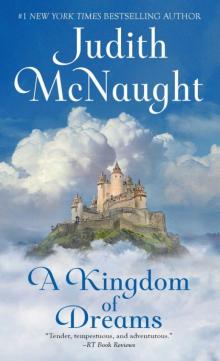 A Kingdom of Dreams
A Kingdom of Dreams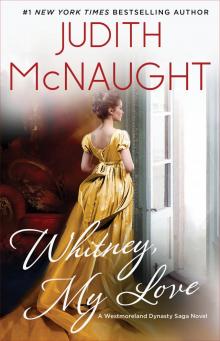 Whitney, My Love
Whitney, My Love Night Whispers
Night Whispers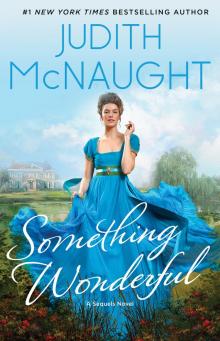 Something Wonderful
Something Wonderful Someone to Watch Over Me
Someone to Watch Over Me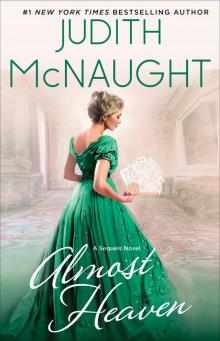 Almost Heaven
Almost Heaven Double Exposure: From a Gift of Love
Double Exposure: From a Gift of Love Tender Triumph
Tender Triumph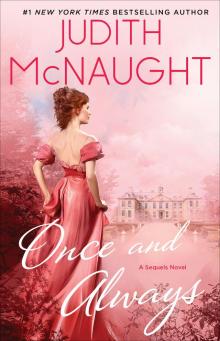 Once and Always
Once and Always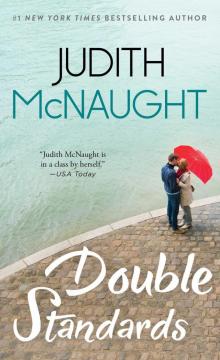 Double Standards
Double Standards